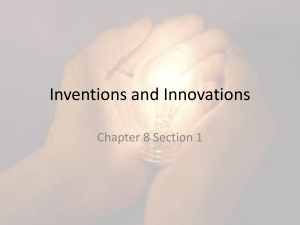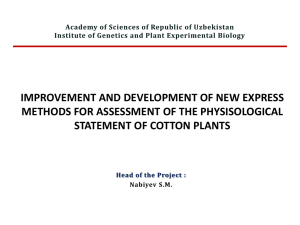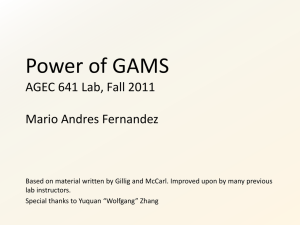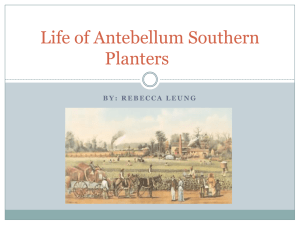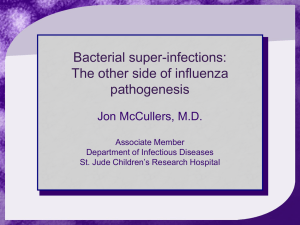Presentation of the project
advertisement
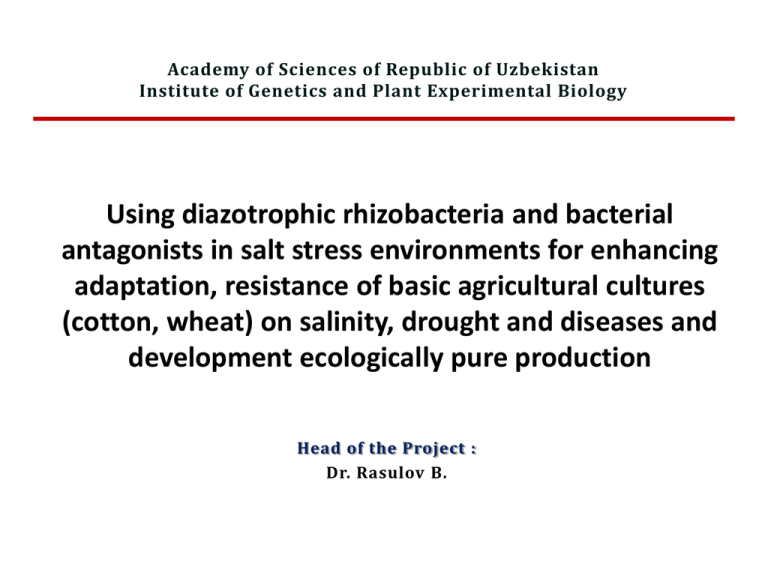
Academy of Sciences of Republic of Uzbekistan Institute of Genetics and Plant Experimental Biology Using diazotrophic rhizobacteria and bacterial antagonists in salt stress environments for enhancing adaptation, resistance of basic agricultural cultures (cotton, wheat) on salinity, drought and diseases and development ecologically pure production Head of the Project : Dr. Rasulov B. O b j e c t ive s : • Study of complex impact of diazotrophic rhizobacteria and bacterial antagonists on adaptation to salt stress and resistance to pathogens of cotton and wheat cultivars in salt affected environments and reducing of the mineral fertilizers usage in agriculture. Development of new agrobiotechnology to obtain ecologically pure agricultural products via application of ecologically friendly microbe biotechnologies, reducing energy and resources in agriculture, and recovering the cycle of basic biogenic elements in the artificial agrocenosis. Ta s k s : • 1). Isolation of diazotrophic rhizobacteria and bacterial antagonists from the rhizosphere of cotton and wheat, identification of bacterial isolates; screening of active nitrogen fixing and antagonist strains against phytopatogens (Fusarium oxysporum f.sp.vasinfectum and Verticillium dahleae). • 2). Study of secondary metabolites (auxins, gibberellins, exopolysaccharides) of diazotrophic rhizobacteria and their ability to mobilize insoluble phosphates. • 3). Study of expression some genes, responsible for salt tolerance in bacteria in salt-affected and water deficient environments • 4). Development of bacterization of agricultural cultivars (via root and leaf) for creating artificial beneficial microbe populations in the cotton and wheat rhizosphere. Expected results from the project: • • • • • • • • The mechanisms of complex impact of nitrogen fixing bacteria and bacterial antagonists on adaptation of cotton and wheat to salt stress will be revealed. New agrobiotechnologies of bacterial treatment of cotton and wheat will be developed. Most active nitrogen fixing bacteria and bacterial antagonists will be selected and molecular-genetic characterization will be clarified. The functional activity of bacterial strains in salt stress will be researched. The role of secondary metabolites in growth and development of cotton and wheat in salt stress will be studied. Expression of some genes, responsible for salt resistance in bacteria will be determined. Optimal conditions for formation of beneficial microbe populations in the cotton and wheat rhizospheres will be elucidated. Recommendations and agrobiotechnologies of complex application of beneficial bacterial strains (nitrogen fixing and antagonist bacteria) for enhancing adaptation, resistance of cotton and wheat to salt stress, drought and pathogens will be developed. Proposed activities within the framework of the project: • 1. Isolation of diazotrophic rhizobacteria and bacterial antagonists from the rhizosphere of cotton and wheat, identification of bacterial isolates; screening of active nitrogen fixing and antagonist strains against phytopatogens (Fusarium oxysporum f.sp.vasinfectum and Verticillium dahleae). • 2). Study of expression some genes, responsible for salt tolerance in bacteria in salt-affected and water deficient environments • 3). Development of bacterization of agricultural cultivars (via root and leaf) for creating artificial beneficial microbe populations in the cotton and wheat rhizosphere. • 4. Trainings within the project T H A N K S F O R YO U R AT T E N T I O N !
